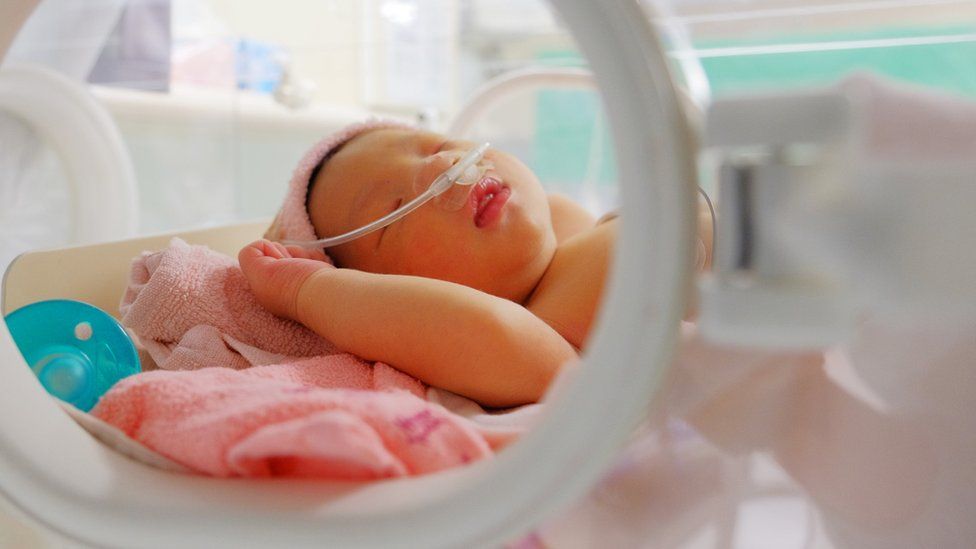ARTICLE AD BOX
 Image source, Getty Images
Image source, Getty Images
A leading vaccine expert says he is "very worried" by the large increase in whooping cough cases which have led to the deaths of five babies in England this year.
Professor Sir Andrew Pollard, head of the UK's vaccine committee, said the youngest were at greatest risk and more pregnant women should be vaccinated.
If the disease continues to spread, more babies will die, he warned.
The whooping cough vaccine is offered to babies and pre-school children.
The "only thing we can actually do" about rising cases of whooping cough is to ensure higher vaccination rates, Prof Pollard told BBC Radio 4's Today programme.
"Very important - for this very vulnerable group, those who are too young to be vaccinated - is the vaccination rate in pregnant women," he added.
"Worryingly, those have fallen from a peak of about 75% of women being vaccinated during pregnancy to under 60% today, and that's what puts these very young infants at particular risk."
London has particularly low vaccination rates of 36.8%.
Why are cases rising?
UK health officials say there have been 1,319 cases of whooping cough in England in March, up from 900 in February, giving a total of nearly 2,800 so far this year.
The bacterial infection, which can develop into prolonged bouts of coughing, is a cyclical disease, with peaks seen every three to five years.
The last peak year came in 2016, when there were nearly 6,000 cases in England.
Half of cases seen so far this year have been in the under-15s, with the highest rates in babies under three months, who are most at risk. The five babies who died this year - the first deaths since 2019 - were all under three months old.
"The troubling thing is that if we continue to have high rates of spread and low rates of vaccination, there will be more babies severely affected, and sadly there will be more deaths," Prof Pollard said.
More on whooping cough
A steady decline in uptake of the vaccine and the very low number of infections seen during the pandemic, were both factors in the rise in cases, the UK Health Security Agency said.
This also happened with other infections, because restrictions on socialising during the pandemic meant that diseases which normally spread widely were stopped in their tracks, and a peak year was therefore overdue.
In September 2023, the number of two-year-olds who completed their routine six-in-one vaccinations, which includes protection against pertussis, was 92.9%, down from 96.3% in March 2014.
Uptake of the maternal pertussis vaccine, which is offered during every pregnancy and provides some protection to babies in the first few months of life, has also dropped.
What is whooping cough?
The first signs are similar to a cold, with a runny nose and sore throat.
After about a week, the infection can develop into coughing bouts that last a few minutes and are typically worse at night.
Young babies may make a distinctive "whoop" or have difficulty breathing after a bout of coughing.
The bacterial infection spreads through coughs and sneezes.
People of all ages can catch whooping cough, but it is most serious for young children and babies.
What can people do to protect themselves?
Health experts are urging those not vaccinated to come forward to get the jab.
The whooping cough vaccine is routinely given as part of the:
- 6-in-1 vaccine - for babies at 8, 12 and 16 weeks
- 4-in-1 pre-school booster - for children who are three years, four months old
If you are pregnant, you should also have the whooping cough vaccine - ideally between 16 and 32 weeks.
Children who have not been vaccinated can still get the jab up to the age of 10. Vaccination offers enough protection that, if the child is infected, the illness will be mild.
Prof Kamila Hawthorne, who chairs the Royal College of GPs, said it was "highly concerning" that such a high number of whooping cough cases had been confirmed.
She said whooping cough was an uncomfortable experience for most patients, causing restless nights and shortness of breath - but for some it could be "far more serious".
Dr David Elliman, consultant in community child health at Great Ormond Street Hospital in London, said: "While the vaccines against whooping cough are not 100% protective, they enormously reduce the chances of babies dying.
"Parents should ensure that their babies are immunised on time, but as importantly, that they get the vaccine when pregnant."
He also said the rise in cases of this infection, as well as of measles, should be "a wake-up call to the NHS", adding: "For too long, successive governments have paid lip service to the importance of preventative healthcare. It is now time that appropriate resources are provided to back up the rhetoric."
Related Internet Links
The BBC is not responsible for the content of external sites.

 1 year ago
73
1 year ago
73








 English (US) ·
English (US) ·